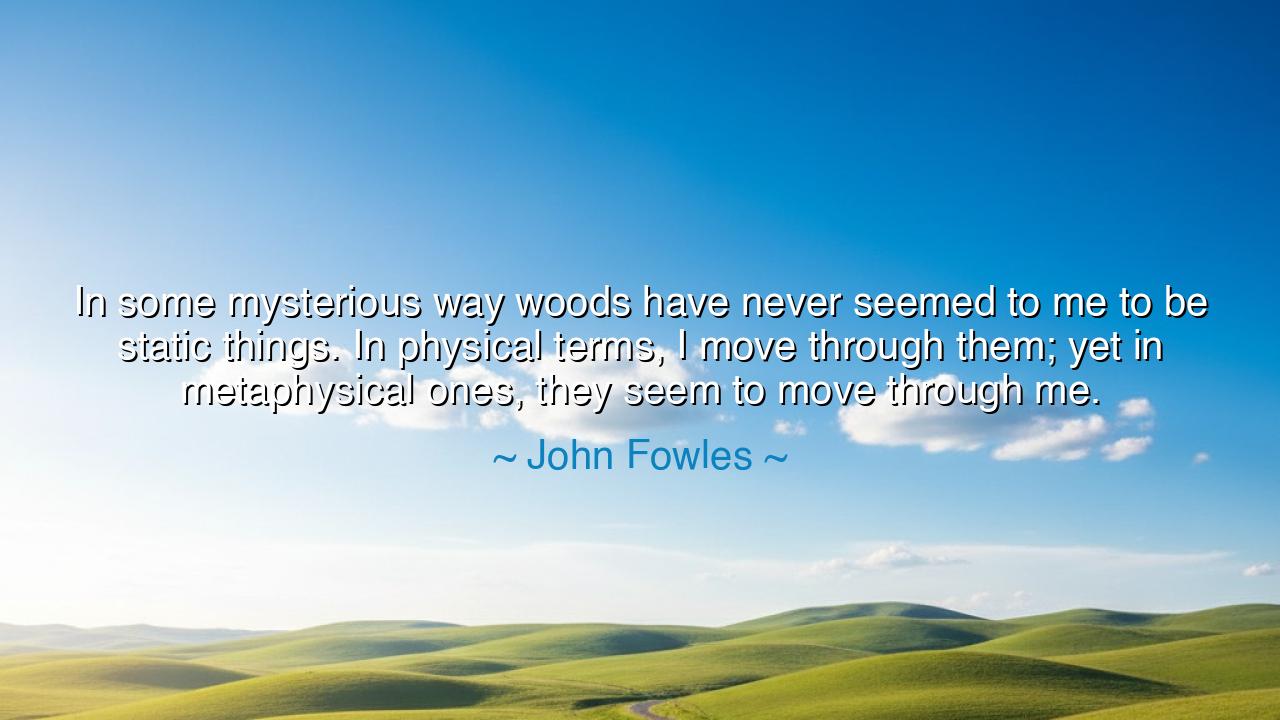
In some mysterious way woods have never seemed to me to be
In some mysterious way woods have never seemed to me to be static things. In physical terms, I move through them; yet in metaphysical ones, they seem to move through me.






John Fowles, the novelist of mystery and depth, once confessed: “In some mysterious way woods have never seemed to me to be static things. In physical terms, I move through them; yet in metaphysical ones, they seem to move through me.” In these words, he speaks of the strange power of the natural world to stir not only the body, but the soul. The woods are not merely objects of bark and leaf, but living presences that touch the unseen chambers of the heart. One may walk among the trees, yet feel that the trees themselves are walking through the spirit, reshaping thought, memory, and perception.
The ancients knew this truth long before Fowles gave it voice. The Greeks spoke of sacred groves where the gods themselves were believed to dwell. To enter the woods was not only to step among trees, but into the domain of spirits, into a place that altered the soul. The Druids of the Celts, too, worshipped in forests, believing that wisdom was not learned in halls of stone but in communion with living nature. Thus, the idea that the woods move through man is as old as myth itself: for when one emerges from the forest, one is never the same as when one entered.
Fowles’s words remind us that human beings are porous creatures, shaped not only by what they touch, but by what touches them. When you walk through a forest, it is not only your feet that move across the soil, but your spirit that is stirred by shadow and light, by rustling leaves, by the haunting stillness between trees. The woods enter you, awaken memories you did not know you carried, speak to the part of you that lives beyond reason. They are mirrors of the soul — vast, ancient, mysterious.
History offers us powerful examples of this truth. Consider Henry David Thoreau at Walden Pond, who went into the woods to live deliberately. He thought he would merely pass through the forest; instead, the forest passed through him, stripping away illusion, teaching him simplicity, and filling him with insights that later shook the conscience of a nation. Or think of the Japanese practice of shinrin-yoku, “forest bathing,” where one does not conquer the woods but lets the woods flow into the body, healing stress, quieting fear, and restoring balance. Here is Fowles’s insight made flesh: man walks through trees, but the trees also walk through man.
The deeper meaning is this: Nature is not passive. It is not a stage upon which humans act, but a force that acts upon us, shaping the very fabric of our being. To see the woods as static is blindness. To see them as alive, moving through our thoughts and breathing into our souls, is to awaken. This awakening transforms how we live. No longer are we strangers to the world, but participants in its mystery, joined to a rhythm that transcends time.
The lesson is clear: do not hurry through the woods as though they were an obstacle. Let them move through you. Let their silence teach patience, their vastness teach humility, their renewal teach hope. When you next walk among trees, do not think only of the path you take, but of the path they carve within you. Carry their stillness into your labor, their resilience into your struggles, their rootedness into your restless days.
Practically, this means creating space in your life to encounter Nature not as scenery but as teacher. Walk often in forests, fields, or gardens. Sit in stillness beneath a tree and let its presence alter your breath. Keep your heart open as you would before a wise elder, for the woods speak not in human words, but in impressions, in movements of the soul. To those who listen, they give not knowledge alone, but transformation.
Thus John Fowles’s vision becomes timeless truth: “I move through the woods; yet they move through me.” Remember this, children of earth. The world is not dead matter, but a living presence that shapes you as much as you shape it. Walk with reverence, let Nature move within you, and you will find that every forest is a sanctuary, every tree a teacher, and every step a journey not only through the world, but into yourself.






AAdministratorAdministrator
Welcome, honored guests. Please leave a comment, we will respond soon